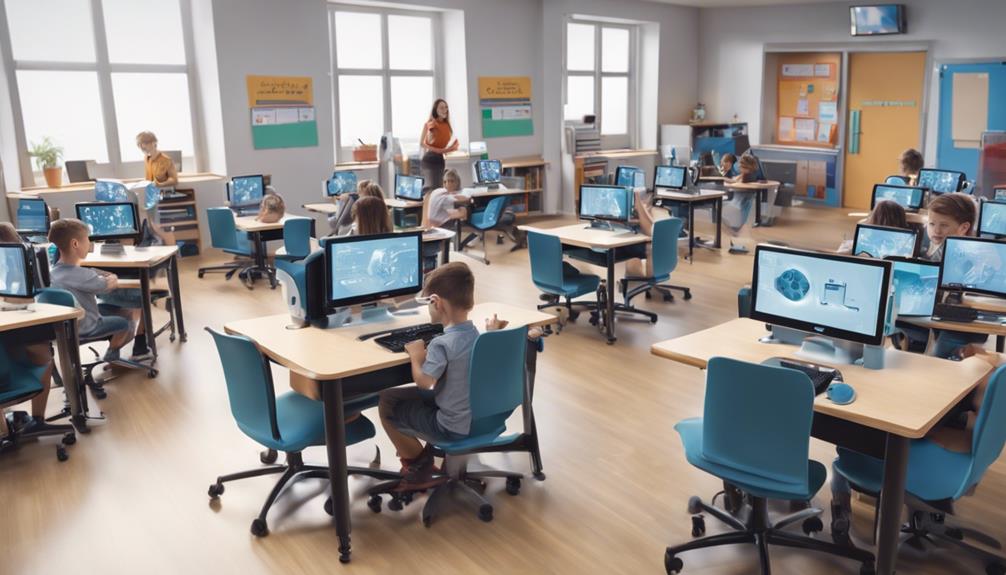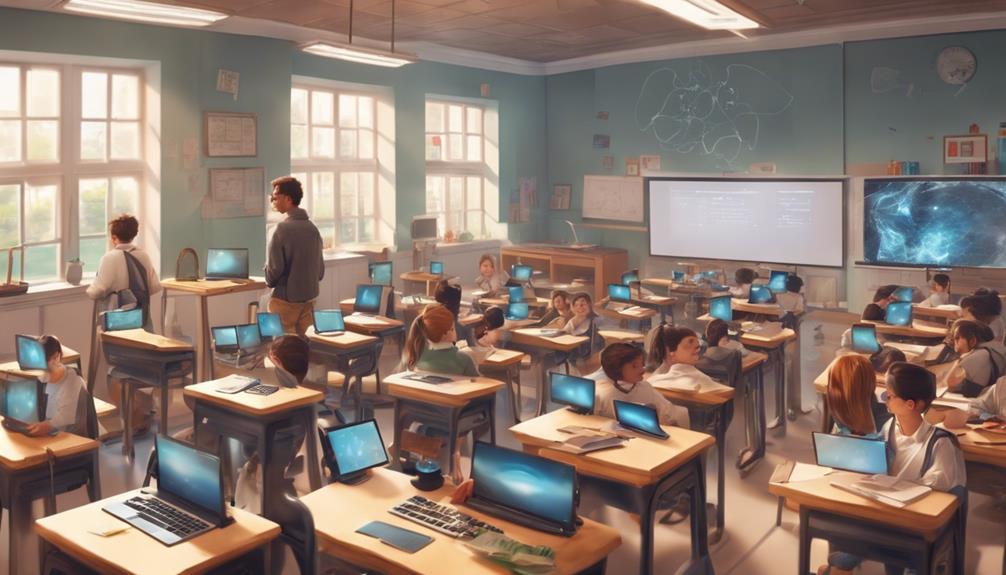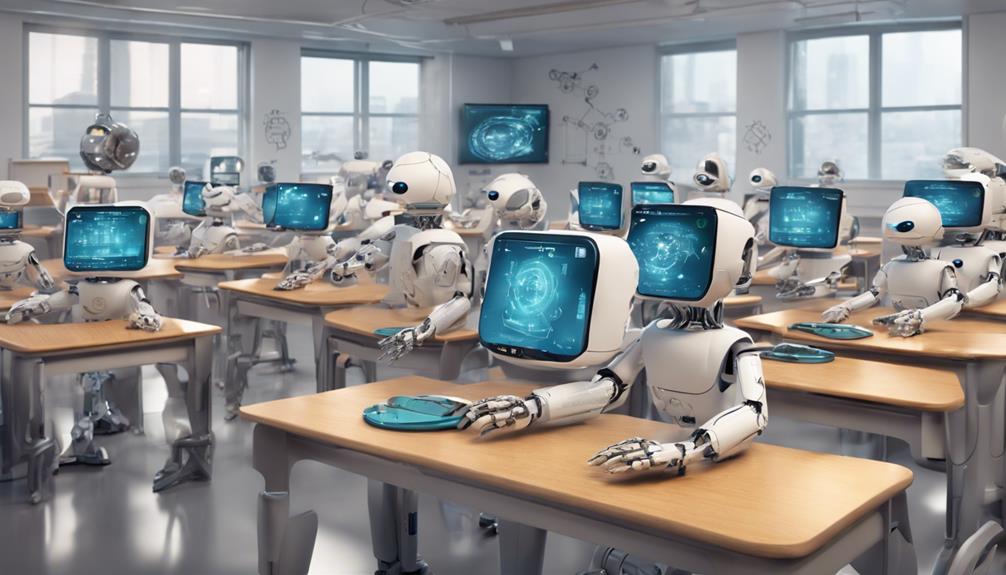With the rapid progress of technology, the significance of artificial intelligence (AI) in the field of education has greatly increased. The notion that AI could potentially replace teachers is sparking curiosity and concern among educators, policymakers, and the public. While AI presents promising opportunities to enhance learning experiences, there is still a discussion about its ability to fully supplant the interpersonal connection that is fundamental to teaching.
The comprehensive guide 'How AI Will Replace Teachers' navigates through this complex landscape, shedding light on the evolving dynamics between AI and teachers, leaving us to ponder the future of education in an AI-driven world.
Key Takeaways
- AI is likely to augment, not replace, teachers by excelling in specific tasks.
- Human teachers are crucial for fostering critical thinking and meaningful relationships.
- AI can revolutionize teaching methods, provide personalized learning, and enhance efficiency.
- Balancing AI with personalized learning and ethical considerations is essential for successful integration.
Current Impact of AI in Education
In the realm of education, the current impact of AI is revolutionizing traditional teaching methods through personalized learning experiences and intelligent tutoring systems. Artificial intelligence (AI) is reshaping how students learn by providing tailored exercises and questions through platforms like Khan Academy. These AI-powered systems adapt to individual student needs, offering a customized learning path that caters to their strengths and weaknesses.
Additionally, AI technology is automating tasks such as grading assignments, freeing up valuable time for human teachers to focus on providing meaningful feedback and guidance to students.
While AI is enhancing the educational experience by offering personalized learning opportunities, it is crucial to note that human teachers remain essential in the learning process. Despite the advancements in AI, the role of human teachers in mentoring, supporting, and inspiring students cannot be replaced. The synergy between AI technology and human educators can create a more effective and comprehensive educational environment where students benefit from both personalized AI-driven learning and the guidance of experienced teachers.
Advantages of AI in Teaching

Leveraging artificial intelligence in educational settings presents a myriad of advantages that encompass personalized learning experiences, data-driven insights, and enhanced efficiency in teaching practices.
AI's ability to analyze vast amounts of student data allows for the creation of personalized feedback tailored to individual learning styles. By processing data for insights into student progress and performance, AI facilitates the development of critical thinking skills essential for academic success.
Moreover, AI systems can automate administrative tasks, such as grading and lesson planning, freeing up valuable time for teachers to focus on fostering interpersonal skills in students. This technology also plays a crucial role in bridging educational gaps in remote areas by providing accessible learning opportunities to a wider audience.
Challenges of AI in Education
With the rise of artificial intelligence in education, the landscape is fraught with challenges that demand careful navigation and strategic solutions to ensure a harmonious integration of technology and human-centric learning approaches.
One of the primary challenges is the fear of AI replacing teachers, which can lead to resistance and skepticism. Additionally, the implementation of AI in education raises concerns about job displacement and the role of human teachers in a technologically advanced classroom.
Balancing the use of AI with maintaining personalized learning experiences is crucial to ensure that students receive tailored support while benefiting from technological advancements. Moreover, ensuring that AI complements rather than replaces teachers requires thoughtful integration strategies that highlight the unique ability of human educators to connect with students on an emotional and intellectual level.
Addressing these challenges will be essential in leveraging AI to its full potential to help students achieve their educational goals while preserving the invaluable role of teachers in the learning process.
Ethical Considerations of AI in Teaching

Amidst the rapid advancement of artificial intelligence in educational settings, prioritizing ethical considerations becomes paramount for ensuring equitable and unbiased outcomes in teaching practices.
Addressing bias in algorithms is crucial to prevent discriminatory practices and ensure fair treatment for all students.
Integrating AI ethics into educational curricula is essential for educating the next generation on responsible AI usage, fostering a culture of ethical awareness and decision-making.
Understanding the economic impacts of AI in education is vital for making ethical choices that consider the financial implications on institutions, students, and society at large.
Responsible use of AI technologies in education necessitates a continuous focus on ethical implications and considerations to uphold integrity and trust in the learning environment.
Moreover, combating misinformation surrounding AI is imperative to promote accurate understanding and ethical implementation of AI in teaching practices, safeguarding against misconceptions that could hinder ethical AI adoption.
Future Outlook: AI Vs. Teachers
In contemplating the future landscape of education, the evolving interplay between AI and teachers prompts a reevaluation of traditional roles and methodologies in the realm of teaching and learning. AI will likely continue to augment rather than replace human teachers, especially in the context of K-12 students.
While AI can excel in certain tasks like providing personalized learning experiences, grading assignments, and offering instant feedback, the human touch remains irreplaceable in fostering critical thinking, emotional intelligence, and creativity. As AI takes on more administrative and repetitive duties, teachers can redirect their focus towards building meaningful relationships with students, customizing learning experiences, and honing their pedagogical approaches.
This shift allows educators to leverage AI as a valuable tool in enhancing the educational journey while retaining the essence of human connection and inspiration in the learning process. By embracing AI as a supportive partner, educators can adapt, innovate, and cater to the diverse needs of students in a rapidly evolving educational landscape.
Frequently Asked Questions
How Will Artificial Intelligence Affect Teachers?
Artificial intelligence will revolutionize teaching by streamlining administrative tasks, offering data-driven insights for personalized instruction, and automating grading. While AI enhances educational processes, human instructors remain vital for providing guidance and inspiration to students effectively.
How Artificial Intelligence Is Changing Teaching?
Artificial intelligence is revolutionizing teaching by personalizing learning experiences, automating administrative tasks, providing instant feedback, and tailoring interventions based on student data. This technology adapts content to individual learning styles, enhancing educational outcomes.
Will Teachers Be Taken Over by Robots?
While AI advancements have impacted various industries, teachers won't be completely replaced by robots. The intricate human elements of education, such as emotional support and mentorship, are irreplaceable by AI. Teachers will continue to play a vital role in shaping students' lives.
Will AI Make Education Obsolete?
While AI presents advancements in education, it cannot render education obsolete. AI can enhance learning experiences, but the human element is irreplaceable for fostering critical thinking and creativity. Education thrives on a holistic approach that combines technology and human interaction.
Conclusion
In conclusion, as AI continues to advance in the education sector, the role of teachers will undergo significant transformations. While AI can enhance teaching efficiency and personalize learning experiences, human teachers will remain essential in providing intuition, support, and personalized attention that AI lacks.
As the adage goes, 'Two heads are better than one,' the collaboration between AI and teachers can lead to a harmonious coexistence that maximizes student learning outcomes in the evolving landscape of education.









